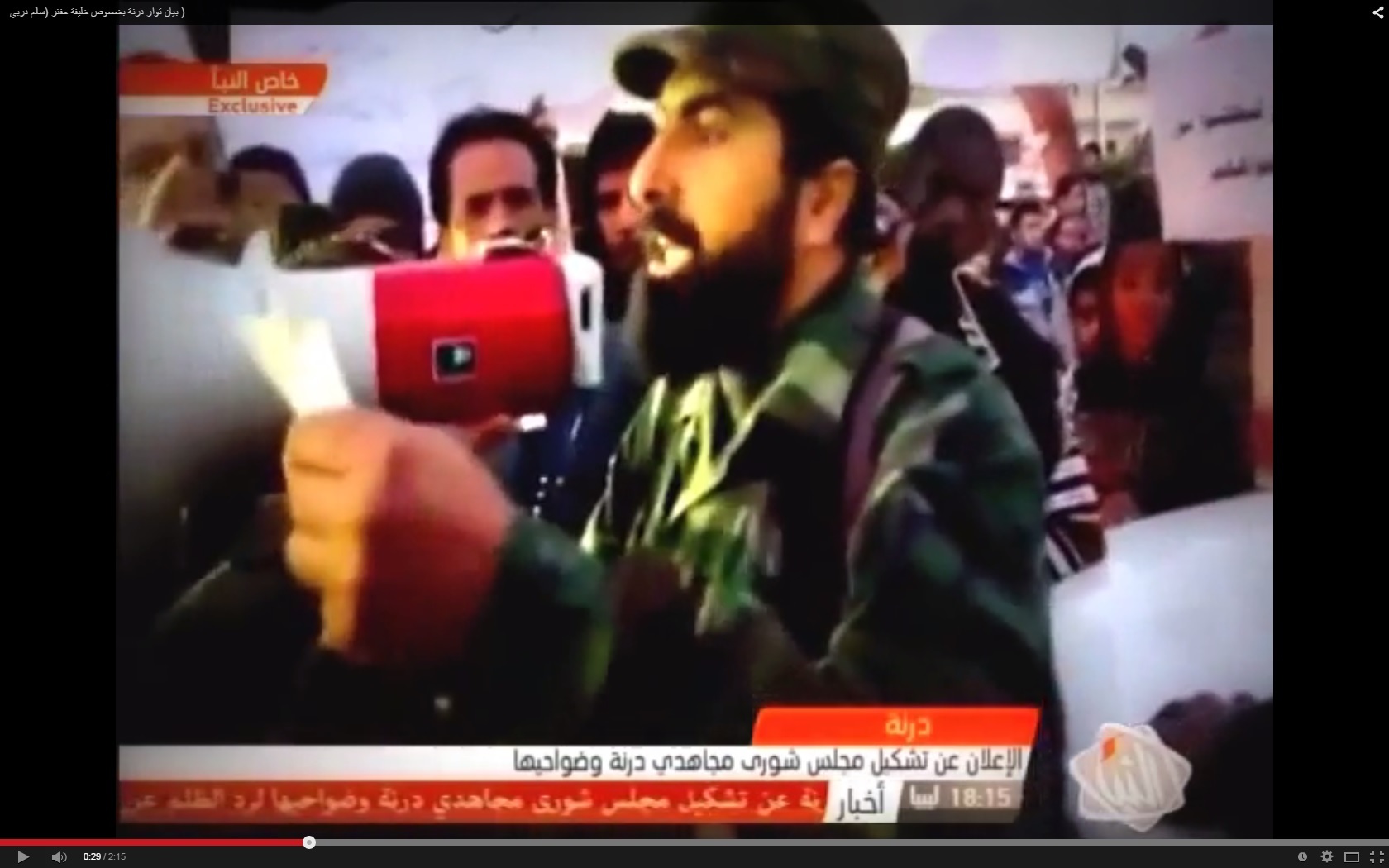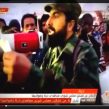
December 2014 Briefs
Publication: Militant Leadership Monitor Volume: 5 Issue: 12
By:

NEW SALAFIST COMMANDER OMAR AL-ANSARI EMERGES IN SOUTHWEST LIBYA
Nicholas A. Heras
Shaykh Ahmad Omar al-Ansari, the leader of the Tuareg Salafist militia Katiba 315, is emerging as one of the most important commanders in the greater Sahara region of southwestern Libya. His organization is based in the city of Ubari, a center of trans-Sahara trade located in the southwestern Libyan province of Fezzan, where the Arab, Tubu and Tuareg ethnic groups predominate. Ubari has been the site of persistent firefights between ethnic Tuareg and ethnic Tubu armed groups over the last several months (al-Jazeera [Doha], December 5; Al-Monitor, November 13; al-Akhbar [Beirut], November 3; Anadolu Agency [Ankara], October 21). Al-Ansari’s Katiba 315 is connected with the broader cross-border jihadist movements in the area, making it a local actor of emerging national and trans-national significance. Pre-existing local communal tensions are being exacerbated by wider political disagreements inside Libya, including support by Tuareg militias in southwestern Libya, including Katiba 315, for the Fajr Libya (Libyan Dawn) militia coalition, which supports the General National Council (GNC) parliamentary faction based in Tripoli (Al-Jazeera [Doha], December 5; Al-Monitor, November 13).
Al-Ansari, who is in his 40s, is a native of Ubari and a scholar of Islamic jurisprudence who opened an Islamic education center in the city. He is frequently linked to trans-Saharan militant Salafist organizations including the predominately ethnic Tuareg northern Malian organization Ansar al-Din (Partisans of the Faith), as well as groups organized by the Algerian jihadist commander Mokhtar Belmokhtar (Sud Ouest [Bordeaux], September 30, 2013). Al-Ansari is also believed to have organized foreign fighters heading to northern Mali and, in this capacity, to have served as a deputy commander to Ansar al-Din’s leader Iyad Ag Ghali (Libya al-Mustaqbal [Tripoli], December 15). Many members of Katiba 315 – which is estimated to have approximately 700 fighters, including members of al-Ansari’s family – reportedly served as soldiers in the Libyan military prior to the fall of the Qaddafi government and traveled to northern Mali to join with Tuareg-organized groups fighting there (Libya Herald [Tripoli], September 20, 2013; Inter-Presse Service, September 13, 2013).
Ubari is an important node in a trans-Sahara militant Salafist network stretching eastward from Mauritania and Morocco through Algeria and Mali to Libya’s coastal Mediterranean cities, including Misrata, Derna and Benghazi (al-Jazeera [Doha], December 5; AP, January 19). This transit route is also part of an international smuggling route for narcotics, weapons and migrants, providing ample opportunity for local militias, including al-Ansari’s Katiba 315, to profit in the process (Jeune Afrique [Paris], March 11, 2013). The militia is reported to serve a strong role in facilitating the movement of militant Salafist fighters into and within Libya (Saudi Gazette [Riyadh], December 21; al-Jazeera [Doha], December 5; Libération [Paris], October 10, 2013; France 24 [Paris], December 12, 2012). Militias in southern Libya, such as al-Ansari’s Katiba 315, also serve as part of Libya’s border guard corps (Libya Herald [Tripoli], September 20, 2013; Inter-Presse Service, May 17, 2013).
Increasing international attention is being given to the trans-Sahara transit routes in southern Libya, where al-Ansari and his organization operate. As a result, southern Libya could be the site of foreign military action in the near future. The French government is reportedly seeking the consent of its regional and international security partners to intervene militarily inside southern Libya against militant Salafist organizations that are utilizing the country’s Sahara regions for refuge and as staging points for future operations (L’Opinion [Paris], November 23; Le Matin [La Mure], October 4; RFI, January 28). Al-Ansari is a critical local commander in the trans-Saharan jihadist network. He and Katiba 315 will likely either be targeted for co-option by internal and international actors seeking to curb the influence and power of militant Salafist groups in Libya and the Sahara region, or will be among the targets of their military operations.
LIBYAN ISLAMIST MILITIA LEADER SALIM BARRANI DARBI FORMS NEW COALITION IN DERNA
Nicholas A. Heras
Islamist militias in Libya’s eastern city of Derna announced the formation of the Majlis Shura Mujahidi (Mujahideen Consultative Council), a coalition that seeks to confront and defeat the Majlis Shura Shabaab al-Islami (MSSI-Islamic Youth Consultative Council), a constituent organization of the Islamic State (al-Arabiya [Dubai], December 13). Shaykh Salim Barrani Darbi is currently the most preeminent leader within the Majlis Shura Mujahidi coalition (Sahafty.net, December 13). Darbi is one of the founding members of Katiba Shuhada Abu Salim, one of the principal organizations in the coalition that has been targeted by Libyan forces loyal to the Tobruk parliament under the command of General Khalil Haftar. Darbi and Katiba Shuhada Abu Salim have actively opposed Haftar’s forces in eastern Libya (AFP; al-Masry al-Youm [Cairo], November 13). [1]
Darbi, 44, was an anti-Qaddafi activist with al-Jama’a al-Islamiya al-Muqatila bi-Libya (Libyan Islamic Fighting Group – LIFG) who fled a crackdown by the Libyan security forces against the militant Salafist group in 1996. He hid in the nearby Jabal al-Akhdar (Green Mountain) range until 2006 (BBC, May 31, 2013; Libya Herald [Tripoli], March 31, 2012; IRRASSA [Derna], October 22, 2011). After returning to Derna, Darbi worked as an entrepreneur before the Libyan revolution erupted in February 2011 (IRRASSA [Derna], October 22, 2011). Darbi helped found Katiba Shuhada Abu Salim (Abu Salim Martyrs’ Brigade), a Derna-based, ideologically Islamist armed opposition group composed of approximately 300 fighters who include local revolutionaries and veteran LIFG fighters. However, Katiba Shuhada Abu Salim was led by the important Libyan revolutionary commander Shaykh Abdel Hakim al-Hasadi, a veteran Libyan international jihadist and former Taliban fighter (al-Watan Libya [Derna], April 6, 2012; BBC, August 31, 2011). Darbi served as a deputy commander to al-Hasadi during the revolution and its aftermath up until al-Hasadi’s decision in 2012 to relinquish active leadership of Katiba Shuhada Abu Salim in order to enter politics as a civilian (Correspondents.org [Tripoli], September 25, 2012; al-Watan Libya [Derna], May 6, 2012). [2]
Since assuming command over Katiba Shuhada Abu Salim, Darbi has become one of the most prominent militia leaders in Derna. He is an important arbiter of the civilian-militia politics in the city and has continued the militia’s social welfare and community projects (al-Jazeera [Doha], September 4, 2013; Shabab Libya [Tripoli], September 28, 2012; Reuters, September 24, 2012). In 2012, Darbi pragmatically ordered that fighters from Katiba Shuhada Abu Salim stand down from their overt security role in Derna, following intense local pressure for the group to demobilize and integrate into the incipient national security forces (Egyptian Independent [Cairo], September 23, 2012). His decision, although eventually repealed, was unpopular among some of his fighters and may have contributed to an unsuccessful car bomb assassination attempt against Darbi in November 2012 (Libya Herald [Tripoli], September 28, 2012; Egyptian Independent [Cairo], September 23, 2012). Darbi attained brief international notoriety when he claimed that “five or six Libyans are dying every day in Syria” in 2013 (BBC, May 31, 2013).
Salim Darbi is likely to continue to be an important Islamist commander in eastern Libya, both in the fighting against MSSI and in the conflict against Libyan forces under the command of General Khalifa Haftar. While Darbi’s personal and political appeal in Libya outside of Derna is likely limited, he and his forces are a core constituency against the spread of the Islamic State outside of Iraq and Syria. His pragmatic decision to demobilize Katiba Shuhada Abu Salim in 2012, while ultimately a temporary decision, could indicate a willingness to engage in a political reconciliation process with anti-MSSI actor in the area of Derna and in wider Libyan politics.
Notes
1. “Statement by the Derna Revolutionaries Regarding Khalifa Haftar (Salim Darbi),” Akhbar Libya YouTube page, December 13, 2014, https://www.youtube.com/watch?v=L0cLFKTm2eg.
2. Please see “Abdel Hakim al-Hasadi and Mahmud Jabril,” Freeeeelibyan YouTube page, July 14, 2012, https://www.youtube.com/watch?v=Ym597lXnl2g and
“Abdel Hakim al-Hasadi Denies al-Qaddafi’s Speech,” al-Jazeera Arabic YouTube page, February 24, 2011, https://www.youtube.com/watch?v=m6OIUcnqUAE.




